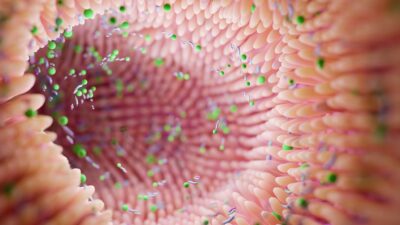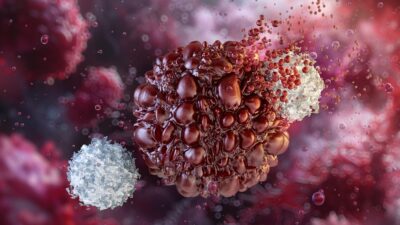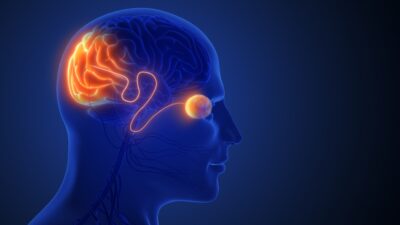The State of the Art in Immune Cell Therapy
- This review shows how far the field has come in manufacturing cells.

A pair of researchers from Stanford University have published a detailed review of the current state of CAR T immune cell therapies in Nature.
A new state of the art in fighting cancer
Chimeric antigen receptor (CAR) is a technology that allows researchers to alter T cells to attack specifically chosen targets. As of this article’s publication, six different CAR T cell therapies have been approved by the FDA to attack various cancers, including B cell lymphoma [1] and leukemia [2].
While these therapies have been shown to be more effective than the previous standard of care for these conditions, there are still problems; the researchers’ analysis shows that this approach controls long-term cancer in only about half of patients. This review is focused on elucidating these problems and the solutions being developed.
Shoring up areas of weakness
CAR T cells require more antigens and greater density than regular T cells to be effective [3]. The literature mentions multiple reasons for this; their signaling capability is significantly changed in many ways, many of which are negative [4], and they tend to be strongly affected by negative feedback [5]. Many of these problems are fundamental to the CAR process itself, and researchers have proposed ways of strengthening the T cells’ signaling abilities to mitigate them [6].
Strength in attacking antigens sometimes comes with a cost, however. Some antigens are expressed solely by cancer cells, so it makes sense to maximize sensitivity to them. Others, however, are expressed at high levels in cancer and at low levels in healthy cells. In these cases, a more nuanced approach is required and is in development [7].
CAR T cells can also be prone to exhaustion [8]. This is well-known as a hallmark of aging in stem cells, but it can also happen to some cellular therapies as well. Subjected to the stresses of their environment, such as high tumor burdens, the donated cells stop performing their functions. Some experiments have shown that certain mutations can alleviate this problem [9].
A substantial number of modifications
The researchers list a substantive amount of advancements made in the CAR T field, including applying logic gates to enhance specificity, a wide variety of gene knockouts and insertions (including a suicide gene for safety), other regulatory platforms, endogenous immune system recruitment, and, in therapies designed to attack T cell cancers, ways to prevent the CAR T cells from killing each other (fratricide) [10].
This review also discusses modifications related to manufacturing, including allogeneic CAR T cells that come from a centralized source and can be injected into many different patients. Preventing immune issues, such as graft-versus-host disease, is the key concern of these products, and work steadily continues on gene knockouts and modifications that alleviate this problem.
Conclusion
While this review is largely specific to CAR T cells and their effects on cancer, many of the problems and solutions expressed in this review apply to cellular therapies in general. Preventing exhaustion of the freshly injected cells, defending against immune rejection, and genetic engineering to enhance specific aspects are all critical in such therapies. It might also be possible and beneficial to turn CAR T cells against other unwanted cells, such as excessive senescent cells.
The fields of immunology, synthetic biology, genetic engineering and cell manufacturing are synergizing to create smarter, safer and more accessible cellular therapies that are poised for increased efficacy and access, diminished risk and cost, and broader utility, for the treatment of cancer as well as non-malignant diseases.
Literature
[1] Abramson, J. S., Palomba, M. L., Gordon, L. I., Lunning, M. A., Wang, M., Arnason, J., … & Siddiqi, T. (2020). Lisocabtagene maraleucel for patients with relapsed or refractory large B-cell lymphomas (TRANSCEND NHL 001): a multicentre seamless design study. The Lancet, 396(10254), 839-852.
[2] Pasquini, M. C., Hu, Z. H., Curran, K., Laetsch, T., Locke, F., Rouce, R., … & Grupp, S. (2020). Real-world evidence of tisagenlecleucel for pediatric acute lymphoblastic leukemia and non-Hodgkin lymphoma. Blood advances, 4(21), 5414-5424.
[3] Anikeeva, N., Panteleev, S., Mazzanti, N. W., Terai, M., Sato, T., & Sykulev, Y. (2021). Efficient killing of tumor cells by CAR-T cells requires greater number of engaged CARs than TCRs. Journal of Biological Chemistry, 297(3).
[4] Dong, R., Libby, K. A., Blaeschke, F., Fuchs, W., Marson, A., Vale, R. D., & Su, X. (2020). Rewired signaling network in T cells expressing the chimeric antigen receptor (CAR). The EMBO Journal, 39(16), e104730.
[5] Harris, D. T., Hager, M. V., Smith, S. N., Cai, Q., Stone, J. D., Kruger, P., … & Kranz, D. M. (2018). Comparison of T cell activities mediated by human TCRs and CARs that use the same recognition domains. The Journal of Immunology, 200(3), 1088-1100.
[6] Majzner, R. G., Rietberg, S. P., Sotillo, E., Dong, R., Vachharajani, V. T., Labanieh, L., … & Mackall, C. L. (2020). Tuning the Antigen Density Requirement for CAR T-cell ActivityTuning the Antigen Density Requirement for CAR T Cells. Cancer discovery, 10(5), 702-723.
[7] Heitzeneder, S., Bosse, K. R., Zhu, Z., Zhelev, D., Majzner, R. G., Radosevich, M. T., … & Mackall, C. L. (2022). GPC2-CAR T cells tuned for low antigen density mediate potent activity against neuroblastoma without toxicity. Cancer Cell, 40(1), 53-69.
[8] Fraietta, J. A., Lacey, S. F., Orlando, E. J., Pruteanu-Malinici, I., Gohil, M., Lundh, S., … & Melenhorst, J. J. (2018). Determinants of response and resistance to CD19 chimeric antigen receptor (CAR) T cell therapy of chronic lymphocytic leukemia. Nature medicine, 24(5), 563-571.
[9] Li, W., Qiu, S., Chen, J., Jiang, S., Chen, W., Jiang, J., … & Wang, H. (2020). Chimeric antigen receptor designed to prevent ubiquitination and downregulation showed durable antitumor efficacy. Immunity, 53(2), 456-470.
[10] Gomes-Silva, D., Srinivasan, M., Sharma, S., Lee, C. M., Wagner, D. L., Davis, T. H., … & Mamonkin, M. (2017). CD7-edited T cells expressing a CD7-specific CAR for the therapy of T-cell malignancies. Blood, The Journal of the American Society of Hematology, 130(3), 285-296.







